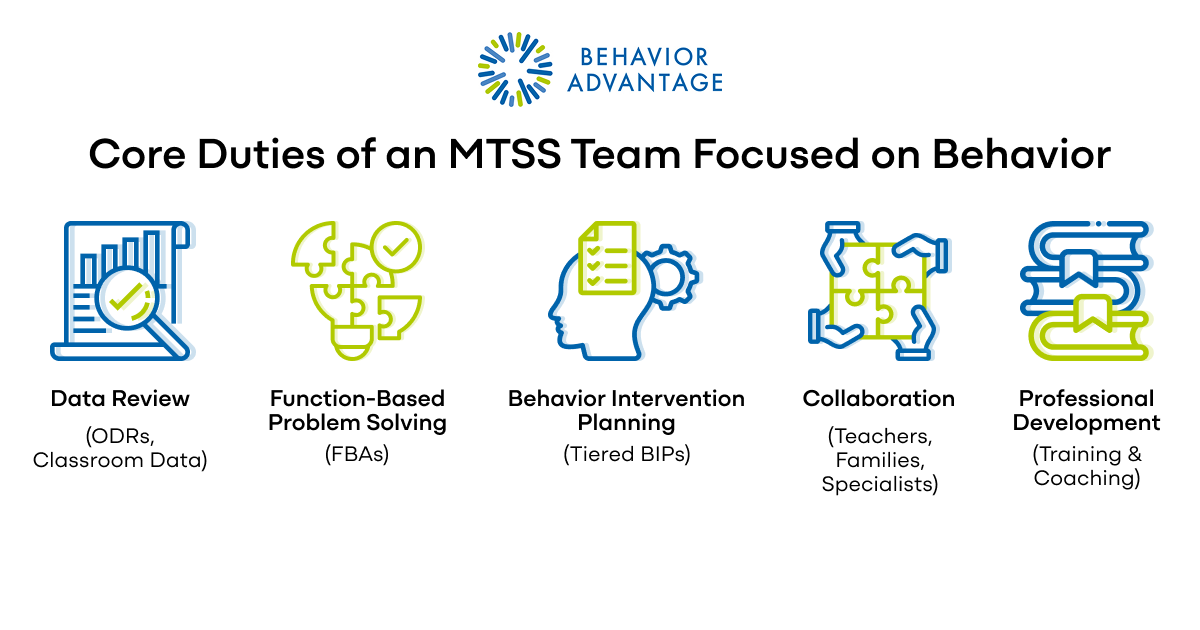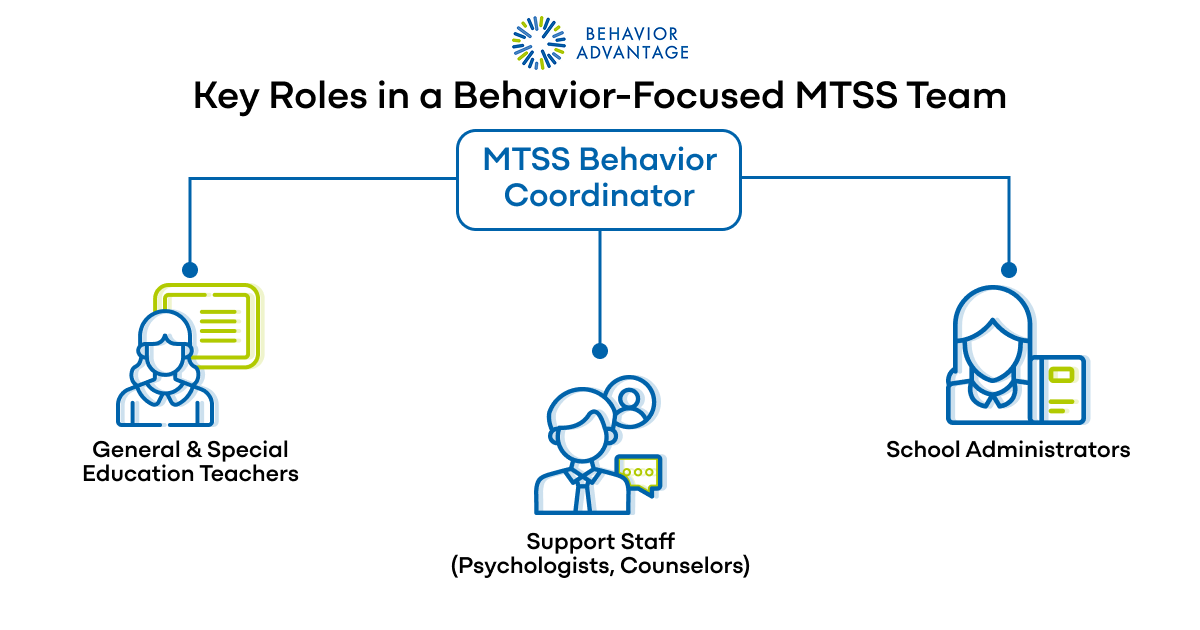A Multi-Tiered System of Supports (MTSS) team focused on behavior is essential for creating a structured, proactive approach to managing student behavior in schools. Effective behavior support not only reduces disciplinary incidents but also fosters positive social interactions, emotional self-regulation, and academic success. Leading experts in the field of MTSS emphasize the importance of an MTSS system that promotes a continuum of function-based behavior supports such as Functional Behavioral Assessments (FBAs), Behavior Intervention Plans (BIPs), function-based problem solving, and functional thinking to support any student struggling with behavioral challenges.
Despite the benefits of MTSS for behavior, many schools struggle with inconsistent behavior plans, difficulty sharing information, and staff turnover, which can disrupt intervention efforts. This article outlines the essential roles, responsibilities, and best practices for building an MTSS team that specializes in behavior support, ensuring alignment with federal guidance and evidence-based practices. Additionally, when academic difficulties contribute to behavior challenges, the MTSS team should collaborate with the academic MTSS team to ensure comprehensive student support.
What Does an MTSS Team for Behavior Do?
 An MTSS team focused on behavior ensures that students receive structured, tiered interventions that promote appropriate behavioral skills and prevent the need for exclusionary discipline. Their primary duties include:
An MTSS team focused on behavior ensures that students receive structured, tiered interventions that promote appropriate behavioral skills and prevent the need for exclusionary discipline. Their primary duties include:
- Data Review: Analyzing office discipline referrals (ODRs), classroom behavior tracking data, and teacher reports to identify students in need of support.
- Function-Based Problem Solving: Conducting Functional Behavior Assessments (FBAs), either formal or informal, to determine the root causes of behavior challenges and inform intervention planning.
- Behavior Intervention Planning: Selecting and implementing evidence-based behavioral interventions at Tier 1, Tier 2, and Tier 3 levels. Developing and monitoring Behavior Intervention Plans (BIPs) to provide targeted, function-based support to students.
- Collaboration: Ensuring clear communication among teachers, administrators, behavior specialists, and families to promote a team-based approach to behavior support.
- Professional Development: Training staff on behavior management strategies, positive relationships, and intervention techniques.
When students’ behavior challenges stem from academic struggles, the MTSS team should coordinate with academic interventionists to implement function-based interventions that support both academic and behavioral success.
Key Roles in a Behavior-Focused MTSS Team
 1. MTSS Behavior Coordinator
1. MTSS Behavior Coordinator
The MTSS Behavior Coordinator leads school-wide behavior support efforts and ensures that interventions align with best practices and school priorities.
Responsibilities:
- Facilitate MTSS behavior team meetings with a focus on evidence-based supports and data-driven decision-making.
- Lead function-based problem-solving discussions to ensure behavior interventions are effectively matched to student needs within a collaborative team approach.
- Monitor intervention fidelity and effectiveness through structured data collection.
- Serve as the primary liaison between administration, teachers, support staff, and families to ensure alignment and consistency in behavior intervention efforts.
2. Support Staff & Specialists (Including School Psychologists, Behavior Analysts, Counselors, and Social Workers)
Support staff and specialists—including school psychologists, behavior analysts, counselors, social workers, and interventionists—are an important part of the MTSS team. They guide the assessment, development, and implementation of behavior interventions.
Responsibilities:
- Support the implementation of function-based problem solving, behavior management strategies, as well as, social-emotional and relationship supports in classrooms, using a team-based approach.
- Assist teachers with intervention implementation through modeling, coaching, and direct student support.
- Collect, review, and share behavioral data to inform intervention adjustments and ensure student progress.
If you want to learn more about the role of behavior intervention strategies, read the comprehensive list that we have compiled.
3. School Administrator (Principal or Assistant Principal)
Administrators play a critical role in fostering an MTSS culture that prioritizes positive, proactive behavior supports over exclusionary discipline.
Responsibilities:
- Allocate resources for behavior interventions and professional development.
- Foster a school-wide commitment to function-based support.
- Promote the MTSS model as a continuum of behavior support across both general and special education.
4. General Education and Special Education Teachers
Teachers implement behavior supports within the classroom, reinforcing MTSS interventions at the student level.
Responsibilities:
- Implement Tier 1 classroom management and positive behavior support strategies.
- Provide input on students needing Tier 2 and Tier 3 behavior support.
- Collaborate with MTSS teams to adjust interventions based on progress monitoring data.
Best Practices for Building an Effective MTSS Team for Behavior Support
1. Establish a Clear Behavioral MTSS Framework
- Outline responsibilities and intervention processes.
- Set regular meeting schedules to review student progress and intervention effectiveness.
- Define clear decision-making protocols to support a continuum of function-based support.
The MTSS-B Referral Form can be of great help to the MTSS team, when done right. You can download our free template.
2. Foster a Team-Based Approach
- Establish team norms that emphasize proactive, positive behavior support.
- Encourage open communication between educators, specialists, and families.
- Use data-sharing platforms to ensure consistency in intervention development, implementation, and tracking.
3. Prioritize Data-Driven Decision-Making
- Conduct regular behavior data meetings to analyze intervention effectiveness.
- Use data, such as ODRs, classroom behavior tracking, and functional assessment results to identify and support students.
- Implement a centralized system for tracking and sharing behavior intervention plans and outcomes.
4. Provide Ongoing Professional Development
- Offer training on functional thinking for Tier 1 and classroom management, function-based behavior support for Tier 2, and FBA for Tier 3.
- Use a team-based approach and a coaching model to reinforce best practices in behavior intervention.
- Provide access to on-demand professional development resources through digital platforms.
5. Address Common Challenges
- Inconsistent Behavior Plans: Standardize a continuum of function-based support processes to improve consistency and intervention implementation.
- Difficulty Sharing Information: Use a digital MTSS behavior platform for behavior data tracking systems.
- Training Barriers: Offer flexible, on-demand professional development on behavior interventions and best practices that are both practical and relevant to classroom and school settings.
- Turnover and Burnout: Provide access to behavior planning platforms that make documentation and report writing easy, defensible, and team-based.
Writing a good Behavior Intervention plan can help address many of these challenges. Check our guide on writing effective BIPs, if you want to learn more.
More on Building an Effective MTSS Team
What does an MTSS committee do?
An MTSS committee reviews student behavior and academic data to develop, implement, and monitor tiered interventions. They ensure students receive timely, function-based support to improve outcomes across behavior, social-emotional development, and academics.
What are the roles in MTSS?
Key MTSS roles include a behavior coordinator, school administrators, general and special education teachers, and support staff like counselors, school psychologists, and behavior analysts. Each plays a vital part in developing and delivering tiered, data-driven interventions.
What does an MTSS coach do?
An MTSS coach supports staff in implementing MTSS practices. They provide professional development, model intervention strategies, facilitate data analysis, and help ensure intervention fidelity across tiers of support.
What does MTSS coordinator mean?
An MTSS coordinator oversees the implementation of the MTSS framework in a school or district. They align behavior and academic supports, facilitate meetings, track progress, and coordinate with teachers, families, and specialists to ensure effective, data-driven interventions.
Conclusion
An effective MTSS team for behavior ensures that students receive structured, proactive support that reduces disciplinary incidents and promotes behavioral, social, and academic success. By establishing clear roles, fostering collaboration, and using function-based strategies, schools can build a sustainable, impactful behavior support system.
If your school is looking for resources to strengthen behavior intervention processes, consider using Behavior Advantage—a centralized system designed to streamline behavior support within MTSS. You can schedule a free demo today!









